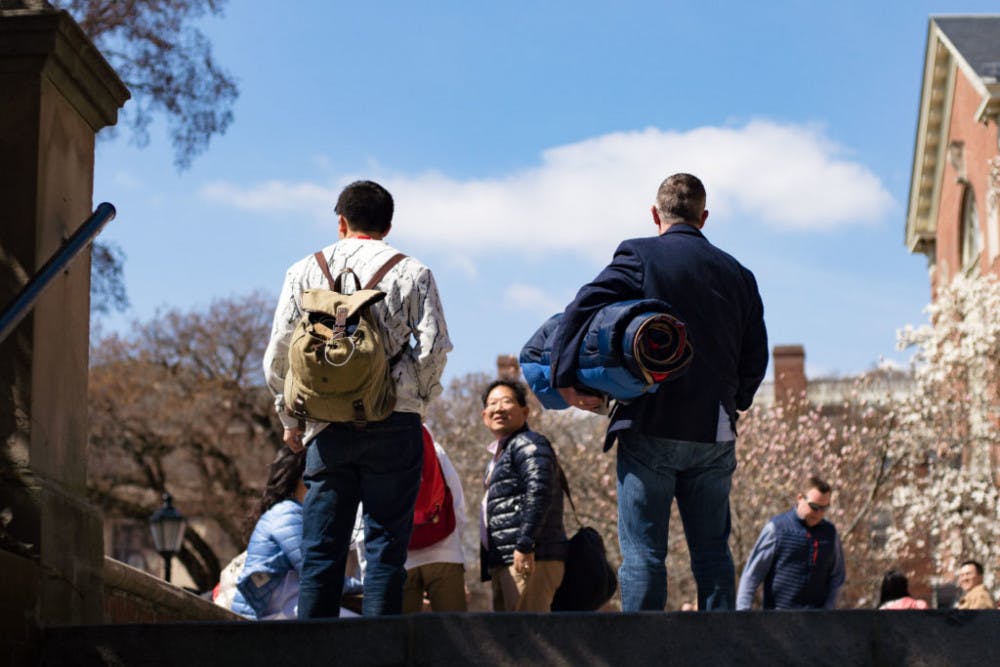Since early March, the conditions created by the COVID-19 pandemic have forced the University to reconsider important aspects of campus life and the student experience. The following is a timeline of the University’s historic moments and administrative decision-making, as it was announced to the Brown community.
Feb 1. Due to the spread of COVID-19, the U. encourages the Brown community to observe increased health precautions in a campus-wide email from Russell Carey ’91 MA’06, executive vice president for planning and policy. At the time, the U. said the immediate health risk to Rhode Island “remains low.”
Feb 29. Members of the Brown community are asked to self-isolate and contact health services if they exhibit a combination of symptoms — including a cough, shortness of breath or fever above 100.4 degrees Fahrenheit — as well as if they have recently traveled to a country with widespread transmission of COVID-19 or have had close contact with a person confirmed to have COVID-19, Carey writes. Additionally, Brown-sponsored travel to China, Iran, Italy or South Korea was temporarily prohibited for students, staff and faculty.
March 5. Brown professor tests negative after coming into contact with someone diagnosed with COVID-19 on a trip to Portugal. The professor previously said he had been denied a COVID-19 test.
March 6. In-person Brown events with 100 attendees or more must be canceled or offered virtually, Christina Paxson P’19 writes in a campus-wide email. Further, Brown suspends all upcoming U.-sponsored international travel.
March 6. Brown cancels “A Day on College Hill” and limits athletic event attendance to players, coaches and essential staff, according to an email from Provost Richard Locke P’18 and Vice President for Campus Life Eric Estes.
March 11. The Ivy League cancels athletic events for the remainder of the academic year.
March 12. All in-person academic instruction is canceled for the remainder of the semester, and students are required to vacate their residences by March 22, Paxson writes in a campus-wide email.
March 14. U. confirms the first positive COVID-19 case in the campus community in an email from Locke. The date by which students are required to vacate campus is moved forward to March 17, Estes and Barbara Chernow, executive vice president for finance and administration, write.
March 24. Brown postpones commencement and Reunion Weekend, Paxson writes.
April 3. U. announces plans to support Providence and Rhode Island during the COVID-19 crisis, namely through a community meal service, a COVID-19 research fund and financial support for local businesses and nonprofit organizations, Paxson writes.
April 7. Brown announces the financial impact of the pandemic on the U. has topped $20 million, Locke writes.
April 13. U. announces the creation of the Healthy Fall 2020 Task Force, Paxson writes.
April 27. Brown suspends on-campus summer programs through July 1, Locke writes.
June 4. Paxson testifies before the U.S. Senate Committee on Health, Education, Labor and Pensions, emphasizing the importance of working to reopen college campuses in the fall and advocating for governmental support of higher education due to the issues presented by the COVID-19 pandemic.
July 7. Brown announces its three-semester plan for the 2020-21 academic year, Paxson writes.
Aug 11. Due to worsening conditions in Rhode Island, the U. announces its phased reentry plan in an email to the Brown community from Paxson. Classes are to be taught remotely until Oct. 5, when in-person classes of less than 20 students may resume.
Sept 10. Brown announces it will move forward with Phase Two of its phased reentry plan, Paxson writes.
Oct 5. Quiet Period ends. Campus moves to Level 2 of Campus Activity Status, allowing in-person instruction for classes and sections of 19 students or less, while planning to gradually reopen campus facilities, Carey writes.

Jack Walker served as senior editor of multimedia, social media and post- magazine for The Herald’s 132nd Editorial Board. Jack is an archaeology and literary arts concentrator from Thurmont, Maryland who previously covered the Grad School and staff and student labor beats.





